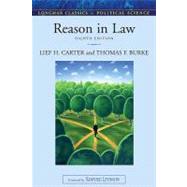
Lief Carter grew up in the Seattle area in the age of “innocent” rock ’n roll (the 1950s). He earned his AB from Harvard College (1962) and his law degree from Harvard Law School (1965). The Vietnam War ended his career as a legal practitioner just as it started. He served in the Peace Corps (Bolivia) as an alternative form of service in 1966–1967 and then returned to graduate school at the University of California-Berkeley, where he earned his Ph.D. in political science (1972). His dissertation received the Corwin Award of the American Political Science Association. He taught at the University of Georgia from 1973 until 1995 and then served for a decade as the McHugh Family Distinguished Professor at The Colorado College. In addition to Reason in Law, he has published books on criminal prosecution, administrative law, and theories of constitutional interpretation. He comprehensively explores the similarities between the requirements of good competitive games—and particularly the requirement that the umpires and referees be impartial—and the requirements of good law doing in his latest publication, “Law and Politics a Play,” appearing in the Chicago-Kent Law Review, volume 3 (2008). Lief lives in Manitou Springs, Colorado.
Tom Burke is proud to have been born and raised in the city of Minneapolis, Minnesota, and to have received his undergraduate degree from the University of Minnesota. Nonetheless, he is also glad to have left his native state for the warm California sun. He received his Ph.D. from the University of California-Berkeley in 1996. At Berkeley Tom studied with many of the professors who two decades earlier had taught Lief Carter, and, like Lief, he received the Corwin Award of the American Political Science Association for his dissertation. In 1996 he began teaching at Wellesley College, just outside of Boston, Massachusetts, where he is the Jane Bishop ’51 Associate Professor of Political Science. He has written articles on campaign finance, the European Union, the Americans with Disabilities Act, how organizations respond to legal mandates, empirical rights scholarship, the Bush Administration’s approach to legal politics, and the place of rights in American politics. His most recent article is ”Political Regimes and the Future of the First Amendment,”Studies in Law, Politics and Society 44 (2008), 107-139.
1 What Legal Reasoning Is, and Why It Matters
An Overview of Law and Politics
A Definition of Law
A Definition of Legal Reasoning
Legal Reasoning Does Not Discover the “One Right Answer.”
The Four Elements of Legal Reasoning
Sources of Official Legal Texts
The Choices That Legal Reasoning Confronts
Illustrative Case
Questions about the Case
2 Change and Stability in Legal Reasoning
Sources of Unpredictibility in Law
Is Unpredictability in Law Desirable?
Vertical and Horizontal Stare Decisis: A Stabilizing and Clarifying Element in Law.
Illustrative Cases
Questions about the Cases
3 Common Law
Origins of Common Law
Reasoning by Example in Common Law
Keeping the Common-Law Tradition Alive
The Common-Law Tradition Today
Illustrative Case
Questions about the Case
4 Statutory Interpretation
What are Statutes?
Four Misguided Approaches to “First Instance” Statutory Interpretation
Purpose: The Key to Wise Statutory Interpretation
Stare Decisis in Statutory Interpretation
A Summary Statement of the Appropriate Judicial Approach to Statutory Interpretation
Illustrative Case
Questions about the Case
5 Interpreting the United States Constitution
“The Supreme Law of the Land”
Conventional Legal Reasoning in Constitutional Interpretation
Judicial Review and Democratic Theory
The Turn to Individual Dignity
Illustrative Case
Questions about the Case
6 Law and Politics
The Rule of Law
Three Threats to the Rule of Law
The Rule of Law as Liberal Justification
Illustrative Case
Appendix A: Introduction to Legal Procedure and Terminology
Appendix B: Law and Politics: The Rule of Law and the Bush Administration
The New copy of this book will include any supplemental materials advertised. Please check the title of the book to determine if it should include any access cards, study guides, lab manuals, CDs, etc.
The Used, Rental and eBook copies of this book are not guaranteed to include any supplemental materials. Typically, only the book itself is included. This is true even if the title states it includes any access cards, study guides, lab manuals, CDs, etc.